|
||||||||||
| Home Nation World Business Opinion Lifestyle ChinAfrica Multimedia Columnists Documents Special Reports |
|
||||||||||
| Home Nation World Business Opinion Lifestyle ChinAfrica Multimedia Columnists Documents Special Reports |
| ChinAfrica |
| Positive Outlook for 2024 |
| China-Africa cooperation in trade, investment and economic development is on the right track |
| By Benard Ayieko | VOL. 16 January 2024 ·2024-01-05 |
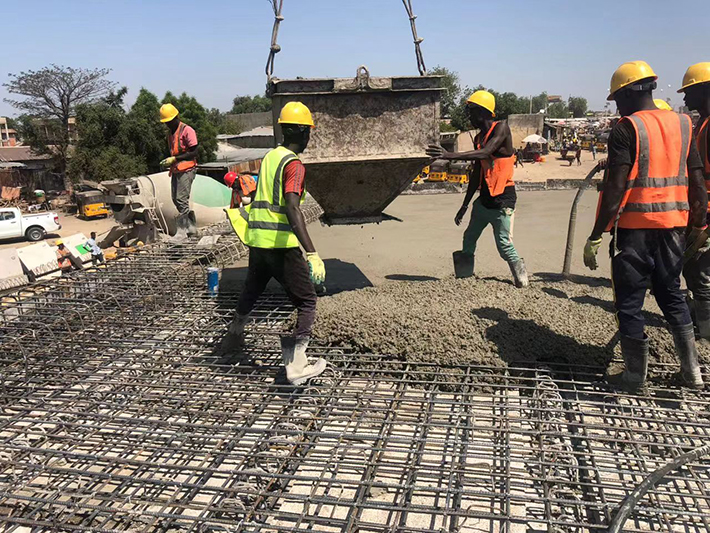
Staff members of a Chinese company work on a road project in Gombe State, Nigeria, on 22 November 2023 (CNS)
The end of the year 2023 and the beginning of 2024 mark a remarkable phase in China-Africa relations. This relationship has evolved significantly and Africa continues to register key milestones in its economic development, particularly in trade, investment and infrastructure. The remarkable growth can be attributed to initiatives by the Chinese government such as the Belt and Road Initiative (BRI), Forum on China-Africa Cooperation (FOCAC), and China International Import Expo (CIIE), among others. Of these, the BRI has been the centrepiece of China-Africa relations.
Last year, the BRI marked 10 years since its launch, ushering in a new phase of development on the continent. Africa has experienced massive infrastructure transformation with key projects being built in gas and oil pipelines, shipping lanes, railways, roads and ports. The Chinese government’s focus on developing infrastructure in Africa was informed by the continent’s poor ranking on infrastructure performance, which is a major impediment to regional integration, poverty reduction, job creation and economic growth and development.
Some of the countries that have undergone transformational growth in infrastructure in Africa include Kenya, Ethiopia, Mozambique, the Democratic Republic of the Congo, Djibouti, Nigeria, Chad, Sudan and South Africa. Commemorating a decade of BRI’s existence last year, the Chinese government noted that 52 out of the 53 African countries that have diplomatic relations with China had either signed or expressed strong interest in signing the BRI cooperation framework agreements for infrastructure development.
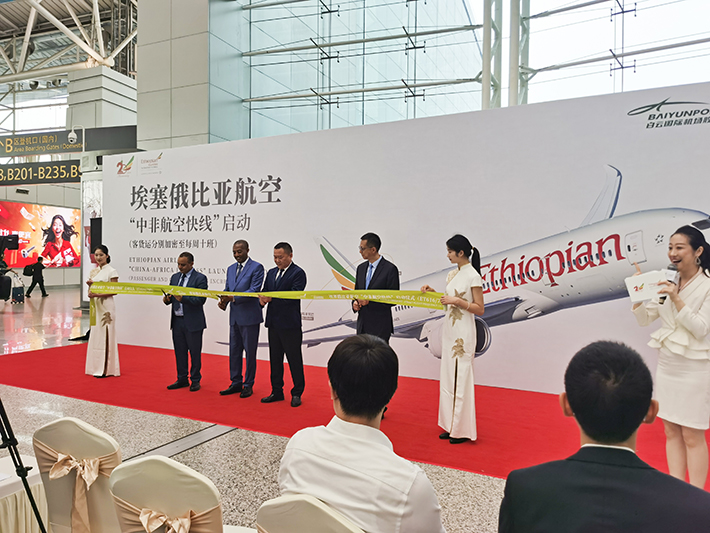
Ethiopian Airlines launches a China-Africa flight in Guangzhou, Guangdong Province, on 26 October 2023 (CNS)
Trade and investment
Since its launch in 2000, FOCAC has been largely responsible for the increase in trade, investment and technical cooperation, giving birth to multi-sectoral growth of the China-Africa bilateral cooperation. According to trade statistics from China’s General Administration of Customs, China-Africa trade recorded steady growth in the first seven months of 2023. Trade between China and Africa also grew by 7.4 percent year on year to 1.14 trillion yuan ($161 billion) between January and July. In a sign of the growing trade relations between China and Africa, the Asian giant has been ranked as Africa’s largest trading partner for the last decade, with bilateral trade totalling $282 billion in 2022. This is an increment of 11.1 percent year on year.
In the first seven months of 2023, China’s exports to Africa grew by 20 percent year on year to 709.59 billion yuan ($100 billion), while imports from Africa grew to 426.65 billion yuan ($60 billion). Chinese goods exported to Africa included ships and automobiles, which recorded significant growth of 81.3 percent and 26.1 percent respectively in the first seven months of 2023. Additionally, exports in mechanical and electrical products grew by 32.5 percent, contributing 50.1 percent to China’s exports to Africa. And when it comes to imports from Africa, China is the largest destination.
The most notable exports to China from Africa are crude oil, metal ore, ore-sand, and agricultural products. Through FOCAC-enabled partnerships, Africa has acquired relevant technology for processing primary products to increase their competitiveness in the international markets. While China has been pushing for increased trade with Africa, efforts have been made to ensure balanced China-Africa trade. Against this backdrop, Chinese President Xi Jinping announced in 2017 that the hosting of the CIIE from 2018 would provide a vast market for African countries to tap into.
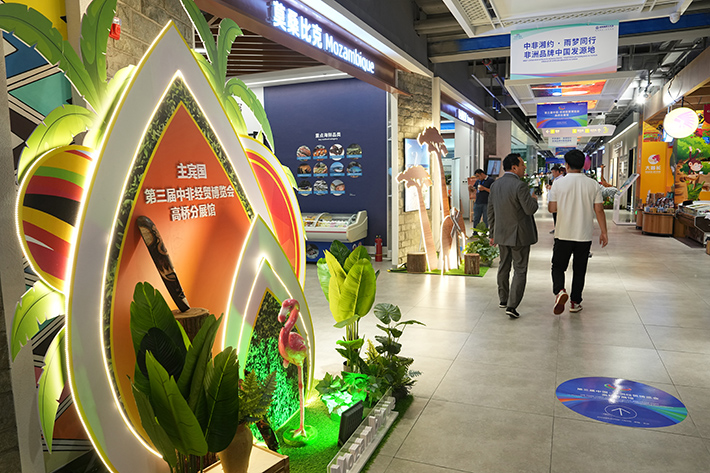
Photo taken on 30 June 2023 shows the Mozambican exhibition hall in the China-Africa Economic and Trade Cooperation Promotion Innovation Demonstration Park in Changsha, Hunan Province (CNS)
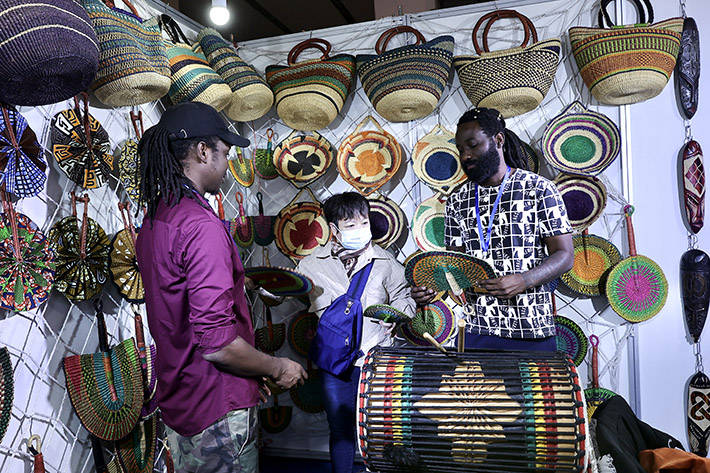
Kenyan exhibitors promote handicrafts at the first Beijing International Cultural and Tourism Consumption Expo in Beijing on 20 October 2023 (CNS)
Looking ahead at 2024
As we welcome 2024, the focus will be on Africa’s collective and legitimate expectations from China as a partner for trade, investment and economic growth and development. In addition to other initiatives aimed at fostering China-Africa relations, the spotlight will be on the seventh edition of the CIIE in November and how African countries will move to capture the Chinese market for export as a way to reduce the trade imbalance, increase the number of Chinese tourists to Africa, increase foreign exchange earnings and create jobs for the unemployed youth.
The Organisation for Economic Cooperation and Development projects that the global economic growth will not exceed 2.9 percent in 2023, but will drop to 2.7 percent in 2024 and will rise to 3 percent in 2025. Inflation will abate and real incomes will strengthen, but global economic growth will be dependent on fast-growing Asian economies - China will play a pivotal role in the recovery of the global economy because of the continuing interdependence.
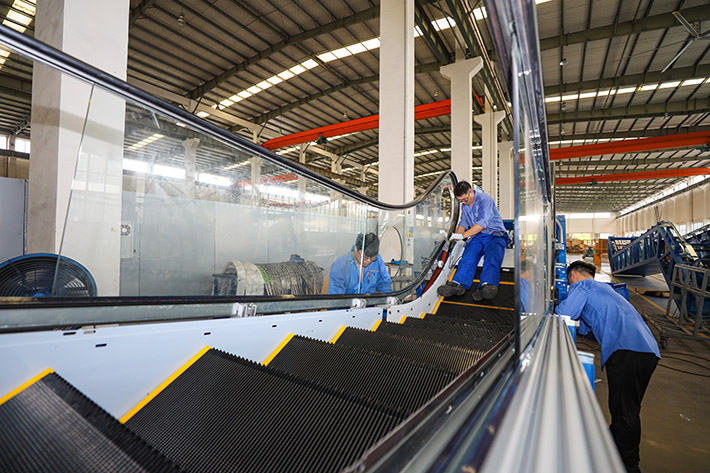
Staff work on an elevator to be exported to Africa in a factory in Huzhou, Zhejiang Province, on 23 August 2023 (CNS)
Meanwhile, the BRI has entered its second decade of implementation and the resolutions of the third Belt and Road Forum for International Cooperation (BRF) that was held in October 2023 will dictate the direction of China-Africa relations in the new year. The future of China-Africa relations will depend on the promises and resolutions of the BRF, FOCAC, the CIIE and the direction of the resurgence of the expanded BRICS grouping.
The immediate future of the socio-economic development of Africa hinges on the successful implementation of the third BRF’s resolutions. President Xi has pledged to build an open, inclusive and interconnected world for common development. He emphasised that Africa will benefit from the expansion of BRI cooperation from physical connectivity to institutional connectivity. More importantly, Africa will be a beneficiary of the principle of extensive consultation, joint contribution and shared benefits, as part of the goal of pursuing high-standard, people-centered and sustainable cooperation. The second decade of the BRI will build a continental network of connectivity that will include economic corridors, international transport routes and information highways along with railways, roads, airports, ports, pipelines and power grids that will make Africa attractive to trade and foreign direct investment.
What has for so long held Africa back is now slowly but surely within sight of a long-lasting solution - infrastructure! The vision of a well-oiled and functional China-Africa partnership for prosperity will be manifested in modern trains speeding along extended rail tracks, automobiles running on a network of roads, flights connecting different African countries, cargo ships finding new ports, and e-commerce bringing more convenience to the African citizenry. China’s support through affordable hydro, wind and solar energy-based power plants will help lower the cost of manufacturing in Africa, and will also remove the perennial bottlenecks caused by energy shortages and high cost of electricity.
FOCAC, too, remains a key driver of the China-Africa relationship. At the eighth ministerial conference held in Dakar in 2021, FOCAC resolved to focus on programmes in nine key areas: poverty reduction and agricultural development, medical and health care, investment promotion, digital innovation, green development, capacity building, cultural and people-to-people exchange, and peace and security. These programmes are in line with the AU’s Agenda 2063 and will strengthen the bilateral cooperation for transforming the continent into the Africa We Want. For FOCAC’s implementation plan to stay on course, the ministerial conference held in Senegal adopted the Dakar Action Plan (2022-2024) that will mature in 2024, the China-Africa Cooperation Vision 2035, the Declaration on China-Africa Cooperation on Combating Climate Change and the Dakar Declaration of the eighth FOCAC Ministerial Conference. As the new year unfolds, Africa will be looking forward to strengthened relations becoming a new frontier for global growth.
The author is Economist, Lawyer, Consultant and Regional Commentator on Trade and Investment in Nairobi, Kenya
| About Us | Contact Us | Advertise with Us | Subscribe |
| Copyright Beijing Review All rights reserved 京ICP备08005356号-5 京公网安备110102005860号 |